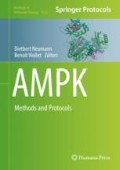Abstract
Distinct lymphocyte subpopulations display discrete metabolic profiles and are differently affected by metabolic resource variations, making the analysis of lymphocyte survival in a complex tissue in response to metabolic stress highly challenging. Here we describe a flow cytometry-based method allowing simultaneous cell identification and viable cell counting in mixed lymphocyte populations without extensive cell subset purification procedures. The example provided herein illustrates the role of AMPK in T lymphocyte survival in response to the mitochondrial poison oligomycin.
Sébastien Denanglaire and Tiphène Pirnay are Co-first authors
Access this chapter
Tax calculation will be finalised at checkout
Purchases are for personal use only
References
Suter M, Riek U, Tuerk R, Schlattner U, Wallimann T, Neumann D (2006) Dissecting the role of 5′-AMP for allosteric stimulation, activation, and deactivation of AMP-activated protein kinase. J Biol Chem 281:32207–32216
Viollet B, Horman S, Leclerc J, Lantier L, Foretz M, Billaud M et al (2010) AMPK inhibition in health and disease. Crit Rev Biochem Mol Biol 45:276–295
Hardie DG (2004) Minireview: the AMP-activated protein kinase cascade: the key sensor of cellular energy status. Endocrinology 144:5179–5183
Marsin A-S, Bouzin C, Bertrand L, Hue L (2002) The stimulation of glycolysis by hypoxia in activated monocytes is mediated by AMP-activated protein kinase and inducible 6-phosphofructo-2-kinase. J Biol Chem 277:30778–30783
Frauwirth KA, Riley JL, Harris MH, Parry RV, Rathmell JC, Plas DR et al (2002) The CD28 signaling pathway regulates glucose metabolism. Immunity 16:769–777
van der Windt GJW, Everts B, Chang C-H, Curtis JD, Freitas TC, Amiel E et al (2012) Mitochondrial respiratory capacity is a critical regulator of CD8+ T cell memory development. Immunity 36:68–78
Pearce EL, Poffenberger MC, Chang C-H, Jones RG (2013) Fueling immunity: insights into metabolism and lymphocyte function. Science 342:1242454
Andris F, Leo O (2015) AMPK in lymphocyte metabolism and function. Int Rev Immunol 34:67–81
Loftus RM, Finlay DK (2016) Immunometabolism: cellular metabolism turns immune regulator. J Biol Chem 291:1–10
Vuillefroy de Silly R, Dietrich P-Y, Walker PR (2016) Hypoxia and antitumor CD8(+) T cells: an incompatible alliance? Oncoimmunology 5:e1232236
Hirayama A, Kami K, Sugimoto M, Sugawara M, Toki N, Onozuka H et al (2009) Quantitative metabolome profiling of colon and stomach cancer microenvironment by capillary electrophoresis time-of-flight mass spectrometry. Cancer Res 69:4918–4925
Ho P-C, Bihuniak JD, Macintyre AN, Staron M, Liu X, Amezquita R et al (2015) Phosphoenolpyruvate is a metabolic checkpoint of anti-tumor T cell responses. Cell 162:1217–1228
Chang C-H, Qiu J, O’Sullivan D, Buck MD, Noguchi T, Curtis JD et al (2015) Metabolic competition in the tumor microenvironment is a driver of cancer progression. Cell 162:1229–1241
Mayer A, Denanglaire S, Viollet B, Leo O, Andris F (2008) AMP-activated protein kinase regulates lymphocyte responses to metabolic stress but is largely dispensable for immune cell development and function. Eur J Immunol 38:948–956
Michalek RD, Gerriets VA, Jacobs SR, Macintyre AN, MacIver NJ, Mason EF et al (2011) Cutting edge: distinct glycolytic and lipid oxidative metabolic programs are essential for effector and regulatory CD4+ T cell subsets. J Immunol 186:3299–3303
Macintyre AN, Gerriets VA, Nichols AG, Michalek RD, Rudolph MC, Deoliveira D et al (2014) The glucose transporter Glut1 is selectively essential for CD4 T cell activation and effector function. Cell Metab 20:61–72
Zola H, Swart B, Banham A, Barry S, Beare A, Bensussan A et al (2007) CD molecules 2006 – human cell differentiation molecules. J Immunol Methods 319:1–5
Acknowledgments
The laboratory is supported by the European Regional Development Fund (ERDF), the Walloon Region (Wallonia-Biomed portfolio, 411132-957270), a Research Concerted Action of the Communauté Française de Belgique, a grant from the Fonds Jean Brachet, and a research credit from the National Fund for Scientific Research, FNRS, Belgium, and by the Belgian Program in Interuniversity Poles of Attraction initiated by the Belgian State, Prime Minister’s office, Science Policy Programming. F.A. is a Research Associate at the FNRS. T.P. was supported by a FNRS/Télévie fellowship.
Author information
Authors and Affiliations
Corresponding author
Editor information
Editors and Affiliations
Rights and permissions
Copyright information
© 2018 Springer Science+Business Media, LLC
About this protocol
Cite this protocol
Denanglaire, S., Pirnay, T., Leo, O., Andris, F. (2018). A Flow Cytometry-Based Protocol to Measure Lymphocyte Viability Upon Metabolic Stress. In: Neumann, D., Viollet, B. (eds) AMPK. Methods in Molecular Biology, vol 1732. Humana Press, New York, NY. https://doi.org/10.1007/978-1-4939-7598-3_29
Download citation
DOI: https://doi.org/10.1007/978-1-4939-7598-3_29
Published:
Publisher Name: Humana Press, New York, NY
Print ISBN: 978-1-4939-7597-6
Online ISBN: 978-1-4939-7598-3
eBook Packages: Springer Protocols

